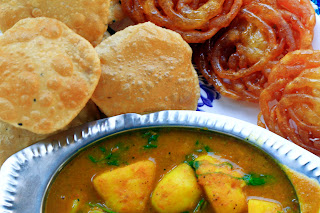A Delectable Republic Day Breakfast: Poori, Aloo Dum,
and Jalebi
This morning
was nothing short of a delightful surprise! After my morning stroll and
freshening up, I returned home to the enticing aroma of a special breakfast
prepared by my wife. On the menu were Poori and Aloo Dum (known as Loochi
and Aloor Dum in Bengali), accompanied by the ever-popular Jalebi.
The sight of this mouthwatering spread left me wide-eyed and even hungrier than
before.
Curious about
this special treat, I asked my wife the reason behind it, and she gently
reminded me that today is Republic Day. I couldn’t help but feel immense
gratitude—for the occasion, for the delectable meal, and for her extraordinary
culinary skills.
The Magic of Poori and Aloo Dum
What can I say
about the taste? It was simply out of this world! The soft, golden Pooris paired
with the rich, slow-cooked Aloo Dum curry were a match made in heaven. For
those unfamiliar, “Dum” refers to the slow-cooking technique used to
prepare the dish, a method that originated in the kitchens of Kashmiri Pandits
in the Kashmir Valley. Over time, this delightful dish has made its way into
the culinary traditions of Punjab, Uttar Pradesh, Bihar, and Jharkhand, where
it continues to be a breakfast staple.
The curry of
Aloo Dum was so flavorful that simply dipping a Poori into it was pure bliss.
The act of slurping the curry felt even more indulgent than savoring it with
the soft, boiled potatoes. This combination is often reserved for festive
occasions or when special guests grace our home, making it all the more
cherished.
Jalebi: A Sweet Finale
No celebratory
meal is complete without dessert, and today, it was the crispy, syrupy goodness
of Jalebi. This dessert, deeply embedded in Northern Indian culture, is made
from fermented batter, deep-fried, and then soaked in sugar syrup. Its origins
trace back to Iran, where it was called “Jilabia,” before making its
way to India in the 15th century.
Jalebi isn’t
just a dessert—it’s a tradition, served during festivals, weddings, and
religious rituals. While it’s commonly enjoyed plain, some prefer it with Khoya
or Chena for added richness. Did you know that Jalebi made with Khoya was first
introduced in 1889 by Harprasad Badkul in Jabalpur?
A Word of Caution
As much as we
love this traditional feast, it’s important to note that Poori, made from
refined flour (maida), isn’t ideal for those managing obesity, diabetes,
or heart conditions. Moderation is key to enjoying these delicacies while
maintaining a healthy lifestyle.
Wishing You a Delicious Republic Day!
As I relished
this special breakfast, I couldn’t help but reflect on the joy of food and its
power to bring people together, especially on meaningful days like today.
Here’s wishing all of you a very happy Republic Day, filled with love,
laughter, and, of course, good food!
Text and Photo
by: Ashok Karan
Read more at: ashokkaran.blogspot.com
If you enjoyed
this post, don’t forget to like, share, and subscribe. Thank you!
#RepublicDay
#TraditionalFood #IndianCuisine #PooriAlooDum #JalebiLove #FoodStories



Leave a Reply